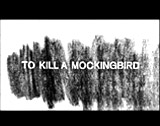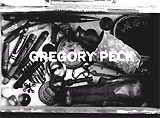
|
To Kill
A Mockingbird (1962)
In director Robert Mulligan's great film adaptation
(by Horton Foote) of Harper Lee's Pulitzer Prize-winning novel:
- in the opening credits sequence, a child's cigar
box (holding trinkets and toys) was opened by a young girl - as
she sang, hummed and giggled to herself, she colored over lined
paper with a round crayon, revealing the title of the film in white
letters, to the tune of Elmer Bernstein's nostalgic and
lyrical score
- the film was composed of flashbacked memories to
1930s Maycomb, Alabama at the height of the Depression, when
racial tensions were heating up; the memories were from
6 year old tom-boy - Jean Louise "Scout" Finch (9 year-old
Mary Badham in her film debut); uncredited Kim
Stanley narrated the film in voice-over as an adult version of Scout
- the opening scene introduced the film's main family:
spectacled widower-father and defense lawyer Atticus
Finch (Oscar-winning Gregory Peck), who was struggling to raise
his two children - "Scout" and
ten-year-old son Jem (13 year-old Phillip Alford in his film debut)
- after his wife died four years earlier
- for much of the summer, "Scout" and Jem were intrigued
and fantasized about a neighboring, creaky old wooden house that
harbored the town's pariah, believing the frightful tale that it
was occupied by a hateful man named Mr. Radley (Richard Hale) and
his mentally-crazed, terrifying son - an elusive, mysterious recluse
named Arthur "Boo" Radley
(Robert Duvall)
- during an intimate bedtime scene in Scout's bedroom,
she finished reading a passage outloud to her father from Robinson
Crusoe; then as Atticus sat motionless and silent
on the porch swing after both his children had gone to bed, Atticus
overheard his children's conversation about their dead mother: (Scout:
How old was I when Mama died? Jem: Two. Scout: How old were you? Jem:
Six. Scout: Old as I am now. Jem: Uh huh. Scout: Was Mama pretty? Jem:
Uh, huh. Scout: Was Mama nice? Jem: Uh, huh. Scout: Did you love her?
Jem: Yes. Scout: Did I love her? Jem: Yes. Scout: Do you miss her?
Jem: Uh, huh)
- the following day, the deeply-principled Atticus
agreed to "take the case" (although he knew it would be unpopular)
to defend an accused black man Tom Robinson (Brock Peters) of rape, and represent
him in the court; he knew that he would face criticism and shunning
from some townsfolk, including hateful poor 'white
trash' redneck Robert E. Lee (Bob) Ewell (James Anderson) - the father
of the alleged rape victim Mayella Violet Ewell (Collin Wilcox)
- after summer came to an end, one day during mealtime
in the Finch household, Atticus delivered a touching speech about
the responsibility his father taught him in using his first gun
when he was thirteen or fourteen - and how it was 'a sin to kill
a mockingbird' - a songbird that harmlessly existed only to give
pleasure: ("I remember when my daddy gave me that gun. He told me that I should
never point it at anything in the house. And that he'd rather I'd
shoot at tin cans in the backyard, but he said that sooner or later
he supposed the temptation to go after birds would be too much, and
that I could shoot all the blue jays I wanted, if I could hit 'em,
but to remember it was a sin to kill a mockingbird...Well, I reckon
because mockingbirds don't do anything but make music for us to enjoy.
They don't eat people's gardens, don't nest in the corncribs, they
don't do one thing but just sing their hearts out for us")
- shortly later, after Scout was reprimanded for bad
manners and intolerance, Atticus eloquently, simply, and tenderly
presented her with an invaluable lesson on how to accept the differences
between one human being and another: "If
you just learn a single trick, Scout, you'll get along a lot better
with all kinds of folks. You never really understand a person until
you consider things from his point of view...Until you climb inside
of his skin and walk around in it"; he also told her about the
meaning and value of compromising
- during a difficult situation when
a rabid dog moved erratically down the street outside their home;
Atticus took aim with a rifle, raised up his glasses a few times on his forehead
to see better, and then removed them altogether by dropping them
on the street; Jem and Scout were both dumbfounded, stunned and impressed
when the rifle cracked and the dog flopped over dead
- in one of the most compelling scenes in the film,
the night before the trial of Tom Robinson was to begin, Atticus sat
guard outside the town jail where
the defendant was being held; four cars noisily converged
on the jail from the Meridian Highway; armed men got out of their
cars and surrounded Atticus - they were a self-appointed lynch
mob that had gathered to take justice into its own hands; Atticus'
two children arrived to be with their father; Jem stood by
his father while a stalwart Scout faced down the crowd and engaged
one of the townsfolk in a disarming, candid, yet humanized conversation;
her words caused him to break up the potential lynching, and the
crowd disbanded
- in the film's main dramatic centerpiece, Atticus
gave an heroic defense in a hot courtroom trial of black man Tom
Robinson, whom he defended when wrongly accused of the rape of
a white woman; during Mayella's testimony, she was disjointed,
confusing, and forced, and left no doubt that she was lying; when Tom
took the stand, it was clear that Mayella had often
invited him inside the fence to do chores; on the day of the alleged
incident, she invited Tom inside the house
to fix a door that didn't need fixing, and then romantically advanced
upon him: ("She hugged me aroun' the waist.
She reached up an' kissed me on the face"); although Tom unequivocally
denied raping or harming Mayella Ewell in any way, he also foolishly
admitted that he felt sorry for
the white woman
- in a final, low-keyed defense summation to the emotionless
jury, Atticus bravely proved the innocence of his client; Atticus
used the testimony about Tom's useless left hand to illustrate that
the white girl Mayella ("the victim of cruel poverty and ignorance")
couldn't have been struck by Tom Robinson; she had been savagely
struck, beaten, and raped by someone who was left-handed (her father);
he also stated that Mayella lied because she broke a code that prohibited
a white woman from becoming sexually attracted to a black man - an
unspeakable offense
- during Atticus' moving closing
court argument, he urged the jury to look beyond race and prejudice:
("In the name of God, do your duty. In the name of God, believe Tom Robinson");
several hours later, the jury returned to the
courtroom; despite a convincing defense, the case was hopeless from
the start - the accused black man was convicted by the prejudiced
white jury
- the blacks in the balcony of the courtroom
stood to respectfully honor the defeated lawyer with Rev. Sykes'
(William Walker) words to Finch's six year-old daughter Scout (Mary
Badham): "Miss Jean Louise, stand up, your father's passin"
- later that night, Sheriff Tate (Frank Overton) came
to tell Atticus that Tom fled from the authorities
and was shot to death while supposedly trying to escape; at
the Robinson home where Atticus went to deliver the bad news to the
family (to Helen and Spence, Tom's father), Helen collapsed when she
sensed that Tom was dead. A hate-filled, disgraced Bob Ewell confronted
Atticus in the yard and after glaring spit into his face. With spit
rolling down his cheek, Atticus defiantly stepped forward, glared
back, wiped the spit from his face with a handkerchief, and climbed
into the car
- by the next fall after attending a Saturday night
pageant at the school, Scout was wearing a ham costume as she was
escorted home by Jem through the dark woods; they were viciously
attacked by an unknown assailant and Jem was seriously injured
(with a fractured arm) and rendered unconscious; when the attacker
[a disgraced and bigoted Bob Ewell] turned toward Scout, a second
pair of hands intervened from an unseen man - they wrestled with
her attacker and came to her defense; she watched a pair of legs
cross her path and under a street light, she saw Jem's limp body
being carried home by a mysterious person; after removing her costume,
Scout followed closely behind and saw her brother being carried
into the Finch yard (and into a bedroom); Sheriff Tate arrived
with Scout's ham costume and revealed a disturbing find in the
woods to a shocked Atticus: " Bob Ewell's
lyin' on the ground under that tree down yonder with a kitchen
knife stuck up under his ribs"
- Scout discovered her demonized neighbor Mr.
Arthur "Boo" Radley behind their bedroom door ("Hey,
Boo") who had saved Jem; she took her guardian angel's
hand and led him out to the front porch where they
sat quietly on the rocking swing; meanwhile, the Sheriff proposed a cover-up
to protect the harmless, innocent Boo from "the limelight" of
public prosecution for killing Ewell; Scout reinforced the idea that
it would be inhumane to subject Boo to a defense trial even if it could be proven
that he killed Ewell to protect them: "Well, it would be sort of
like shooting a mockingbird, wouldn't it?"
- in the film's moving coda, "Scout" sat
on the porch swing with the timid Boo Radley and then she walked
- with his hand in hers - to the Radley gate and up their front walk,
accompanied by Elmer Bernstein's melancholy music score and Jean
Louise's narration as the adult Scout: ("Neighbors bring food
with death, and flowers with sickness, and little things in between.
Boo was our neighbor. He gave us two soap dolls, a broken watch and
chain, a knife, and our lives...One time Atticus said you never really
knew a man until you stood in his shoes and walked around in them.
Just standin' on the Radley porch was enough. The summer that had
begun so long ago had ended, and another summer had taken its place,
and a fall, and Boo Radley had come out. I was to think of these
days many times. Of Jem and Dill and Boo Radley, and Tom Robinson
- and Atticus. He would be in Jem's room all night, and he would
be there when Jem waked up in the morning")
- the camera pulled out of the window in Jem's room,
where "Scout" was cradled in her father's arms, to a long
shot of the Finch house
|

Opening Credits

Atticus in Porch Scene Overhearing His Children

Atticus Talking About Gun Responsibility

Atticus Killing a Rabid Dog on the Street

Atticus' Dramatic Court Defense of Wrongly-Accused Black
Man Tom Robinson

"Your father's passin'"

Boo Behind Door

Scout on Porch with Boo

Scout Walking Boo Home

View From Outside of Jem's Room as Atticus Cradled Scout
in His Arms
|











